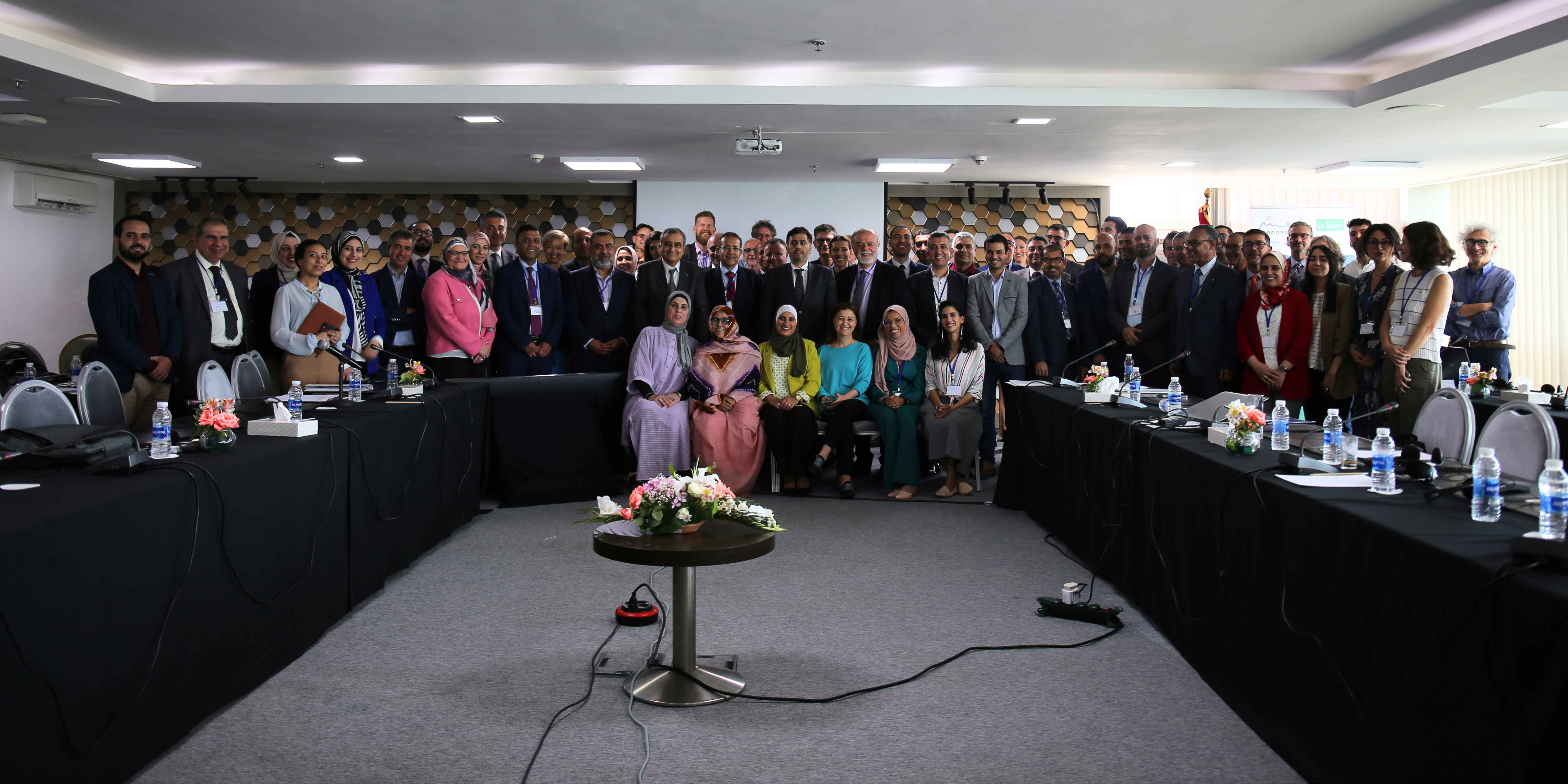The 1st Regional Water-Energy-Food-Ecosystems (WEFE) Nexus Roundtable in the Mediterranean on ‘Promoting Innovation, Investments and Upscaling of Solutions’ (6-7 June 2023, Rabat, Morocco) was attended by more than 160 participants from 15 countries. Representatives of national authorities, stakeholders and regional institutions agreed on the need for a Strategic Framework for the WEFE Nexus in the Mediterranean’s source to sea continuum, to guide integration of policy and management instruments and action lines across sectors to address risks related to water, energy, food and environmental security, and promote leveraging of necessary funding.
Aiming at promoting advances of the WEFE Nexus approach, the Regional WEFE Nexus Roundtable was organized within the joint initiative of the Union for the Mediterranean (UfM), Barcelona Convention and the European Union, by the Global Water Partnership-Mediterranean (GWP-Med) and the Water and Environment Support (WES) in the ENI Southern Neighbourhood region Project Team and was hosted by Morocco’s Ministry of Equipment and Water and Ministry of Energy Transition and Sustainable Development, with contributions by and in the framework of the GEF UNEP/MAP MedProgramme Child Project 2.2. on Nexus, the EU-funded WES project, the Sida/UfM MENA Water Matchmaker 2 Project and the PRIMA WEFE4MED Project.
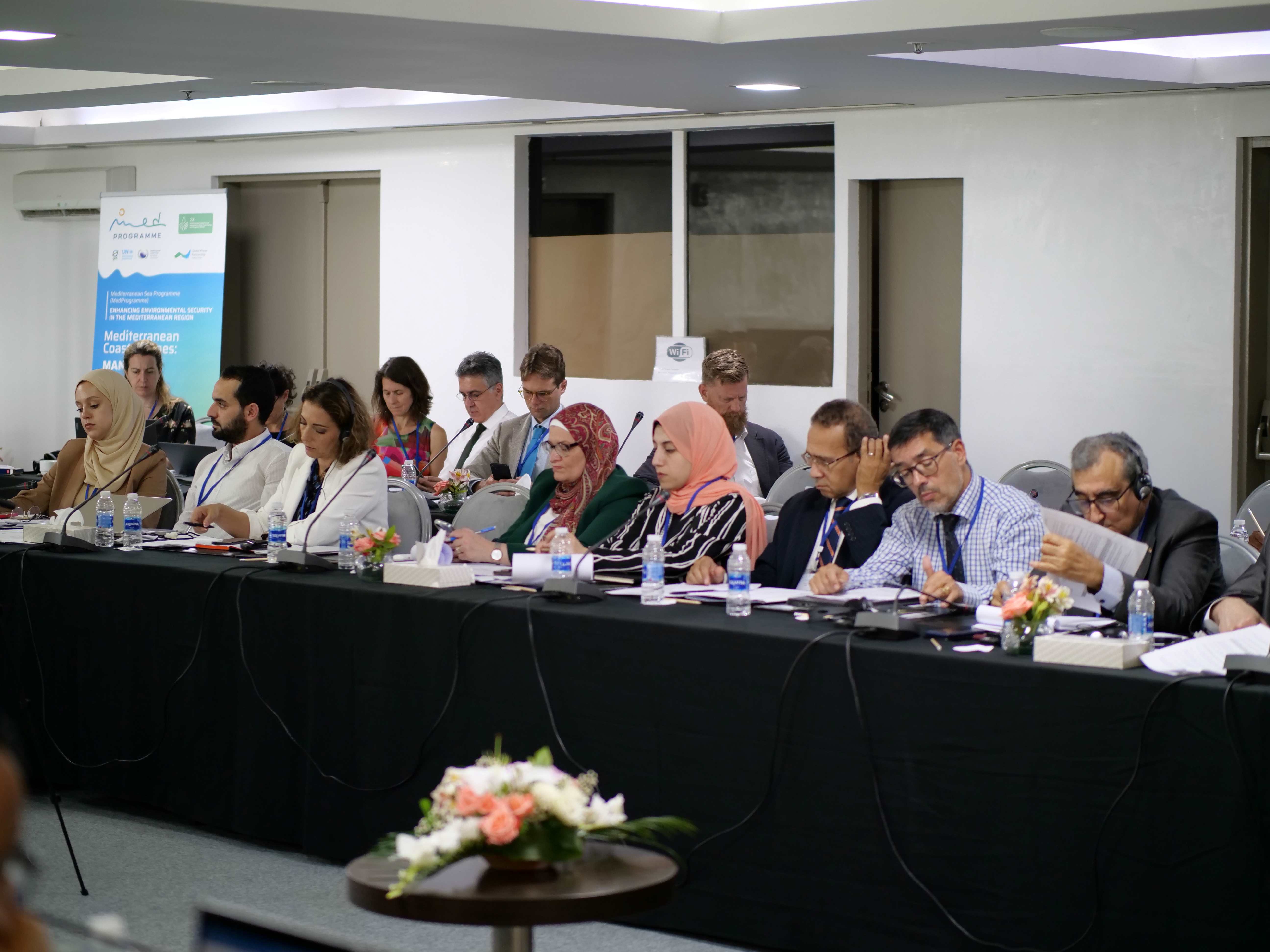
More than 160 participants from 15 countries from the Med attended the 1st Regional WEFE Nexus Roundtable in Rabat.
The Regional WEFE Nexus Roundtable signaled the beginning of a structured dialogue process in the Mediterranean engaging national and local authorities, regional institutions and organisations, academia, civil society, technology partners, financing institutions, gender and youth organisations and many more, coming together to promote WEFE Nexus understanding, facilitate cross-fertilization among institutions and practitioners and enhance coordinated actions in the region, also relating to the coastal and marine environment in a Source-to-Sea approach.
The urgency of implementing a WEFE Nexus approach is driven by the growing recognition that sectoral action cannot guarantee security of supply of related resources and services unless interconnections and trade-offs among water, energy, food and ecosystems are taken always and seriously, into consideration. As more scientific evidence on cross-sectorial interdependencies is becoming available, the WEFE Nexus approach can decisively set the Mediterranean on a climate resilient path through an integrated vision and practice for natural resources security.
In the six Roundtable’s panel discussions, more than 40 representatives from all WEFE sectors exchanged experiences and perspectives identifying suitable policy and governance arrangements conducive to Nexus approach implementation at national, basin, local, coastal and transboundary levels, supported by regional action. Moreover, they explored how to ensure the mobilisation of funding and investments to enable the upscaling and mainstreaming of Nexus technical solutions and innovations. Questions and further interventions by participants brought in vivid exchanges on challenges and solutions towards WEFE Nexus advances.
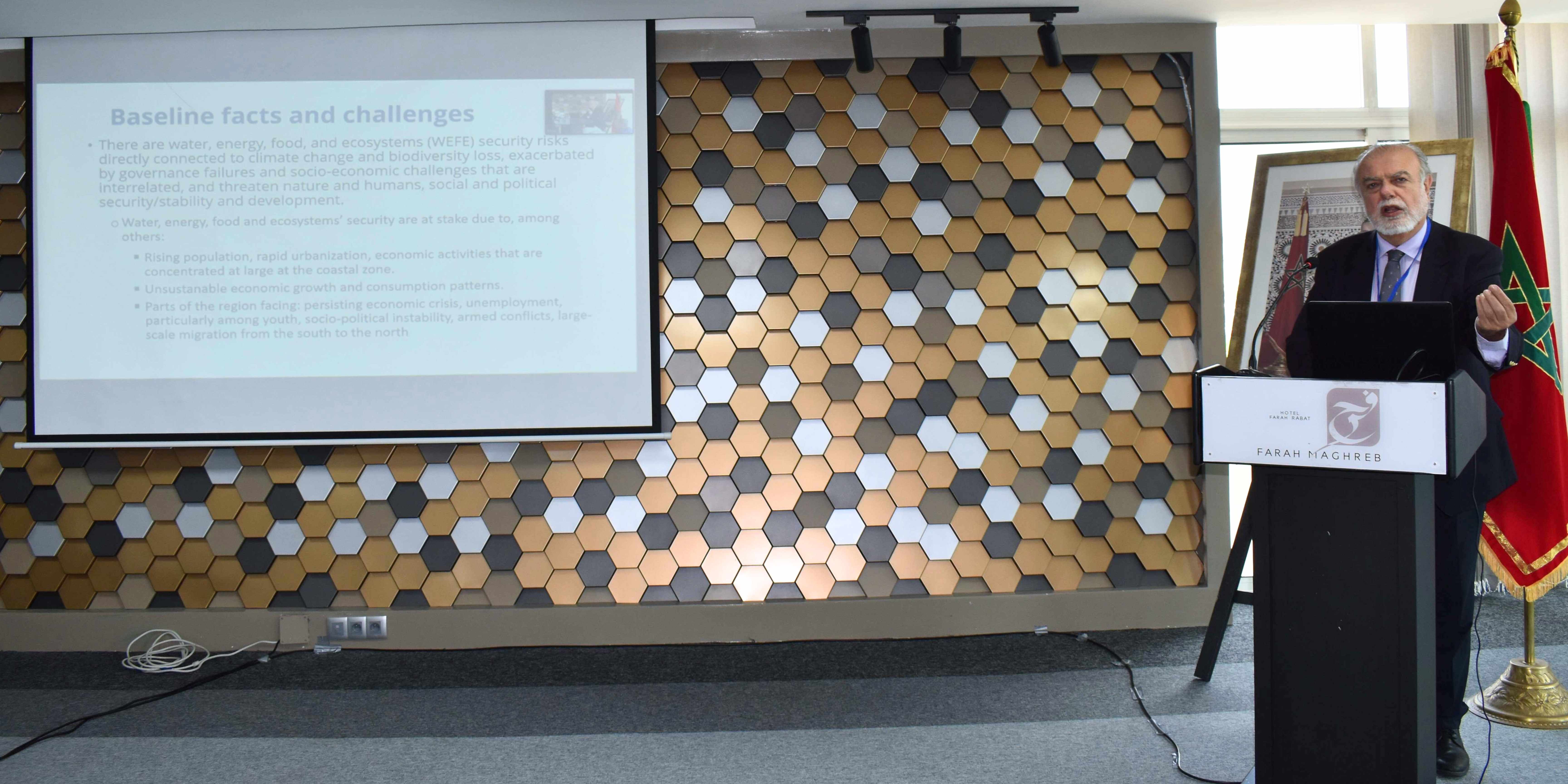
Professor Michael Scoullos, WES Team Leader, gave an introductory presentation on defining and de-mystifying the WEFE-Nexus.
At the beginning of the roundtable and in order to inform discussions, the following were presented:
- Prof. Michael Scoullos, WES Team Leader, gave an introductory presentation on defining and de-mystifying the WEFE Nexus. He underlined that the Nexus approach enhances security and resilience, and explained how policies and practices in each of the Nexus sectors need to take into account and internalise the necessary policy elements of the other sectors by facilitating a coherent and integrated management of all four. He insisted in the three-dimensional visualisation of the WEFE Nexus as educationally and conceptually important.
- Mr. Ali Rhouma, Project Officer for PRIMA, presented an overview of the science advances in the WEFE Nexus as well as the challenges that exist in actually translating WEFE Nexus Science to policies, and suggested ways to bridge them. He went on to analyse PRIMA’s strategy for turning from Nexus thinking to Nexus doing, the solutions that are being promoted throughout 30 demonstration sites and how they can assist governments in shaping policies for the achievement of SDGs.
- The “Gateway to the future of the Mediterranean”, prepared by the EC JRC with over 130 contributors from 65 partners including EC, UfM, GWP-Med, UNEP, UNESCO, World Bank, FAO, UNECE, ministries, NGOs and donors, is an elaborate document encompassing scientific, historical and artistic contributions from the Mediterranean explaining the interconnections of the Nexus sectors from the Mare Nostrum era to this day.
- The draft “Mediterranean Rapid Nexus Assessment”, prepared by GWP-Med in the framework of the GEF/UNEP-MAP MedProgramme. Covering 13 Mediterranean countries, the Assessment identifies for the first time the status, main targets and challenges in the Nexus sectors, the level of integration of policy and institutional frameworks in the management of natural resources including a Gender analysis, and ways forward for tackling Nexus challenges and capturing related opportunities in each country.
- Key learnings from tangible pilot WEFE Nexus technical solutions, including from projects such as the Sida/UfM/GWP-Med MENA Matchmaker 2, which recently completed technical solutions for energy-efficient sustainable irrigation through nature-based solutions in Jordan and Palestine.
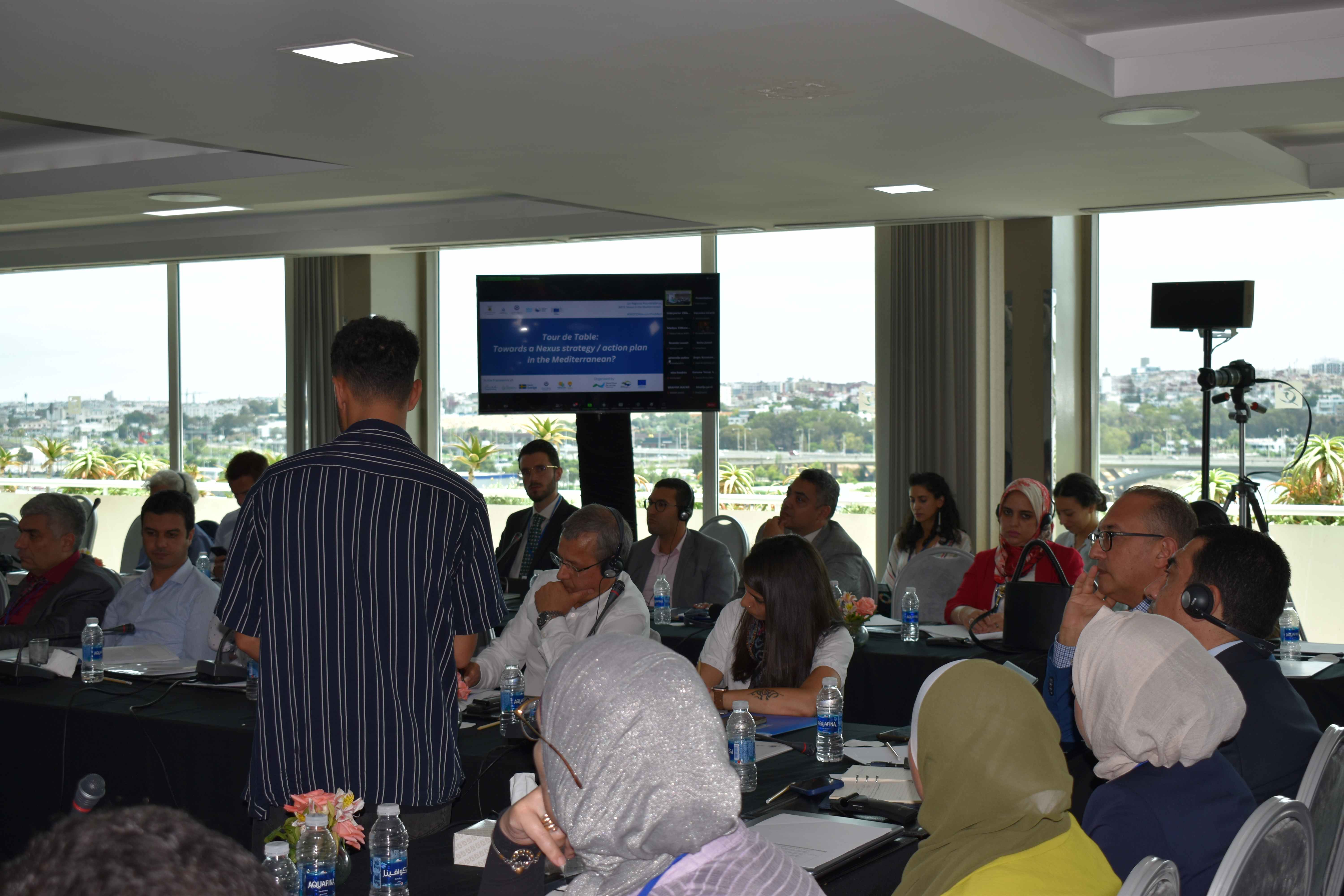
Representatives of national authorities, stakeholders and regional institutions agreed on the need for a Strategic Framework for the WEFE Nexus in the Mediterranean’s source to sea continuum.
Representatives of regional institutions, national authorities and stakeholders discussed options to concretely promote the Nexus approach. They acknowledged that actions are advancing at national level, however these wouldn’t be enough, and coordinated-among-countries-action is necessary to effectively address the WEFE Nexus security risks. They all expressed their commitment to the drafting of a framework document for WEFE Nexus in the Mediterranean source to sea continuum that will:
- take stock and link with existing regional policies/strategies/action plans, adding value and avoiding duplication;
- assist countries and stakeholders enhancing individual and collective (as applicable and necessary) integration of policy and management frameworks and instruments across sectors to address WEFE security related risks;
- promote leveraging of necessary funding.
Such a strategic document should also address in a holistic approach interlinkages in the management of terrestrial, freshwater and marine resources through a Source to Sea approach. Aiming to engage all water-using sectors and fairly and efficiently address their needs and considerations, the promotion of the Nexus approach complements and enhances Integrated Water Resources Management.
The development and eventual adoption of the document will be anchored to appropriate regional frameworks that have the necessary mandate and instruments to enable its implementation and the monitoring of results. The UfM and the Barcelona Convention constitute such -complementary- frameworks covering the entire region. Further, it should be aligned with the EU acquis as this is the overarching institutional and legal framework for integrated management of resources in the Northern part of the Mediterranean, while providing a blueprint for such action in the rest of the Basin.
GWP-Med and the WES project will facilitate the technical drafting process under the auspices of UNEP/MAP, UfM and the EC, and the draft document will be discussed under a multi-stakeholder consultation process served by the MedProgramme.
The overall key Conclusions of the Roundtable can be found here.
The Roundtable was opened by Ms. Leila Benali, Minister of Energy Transition & Sustainable Development, Morocco. During her speech, Ms. Benali stated that “This Roundtable today reinforces our firm and irreversible determination to open a new chapter in the governance of natural resources. Natural resources that are sustainable, economically viable and socially inclusive. This task, as we are all aware, is far from simple. But our commitment is firm since we are not starting from scratch.”
Ms. Tatjana Hema, Coordinator, UNEP/MAP, Barcelona Convention Secretariat stressed that the Nexus approach has multiple benefits. It avoids fragmented solutions and optimizes resources efficiency, circular economy and improves natural resources management while reducing the ecological footprint.
Mr. Almotaz Abadi, UfM Deputy Secretary General for Water, Environment and Blue Economy mentioned that “The Union for the Mediterranean supports the WEFE cross-sectoral approach as an enabling framework to tackle the main regional crises: water scarcity, food insecurity, energy crisis and loss of biodiversity.” He stressed that “It is time to move from ‘Nexus thinking’ to ‘Nexus doing and upscaling’. The Union for the Mediterranean has been instrumental in promoting policies dialogue around the WEFE nexus. Through concrete projects it is now proofing the nexus concept on the ground. Successful examples need now to be replicated and upscaled through innovative approaches. Mobilizing the private sector will be crucial, including through public and private investments, blended financing mechanisms as well as private-public cooperation, also towards jobs creation and income generation.”
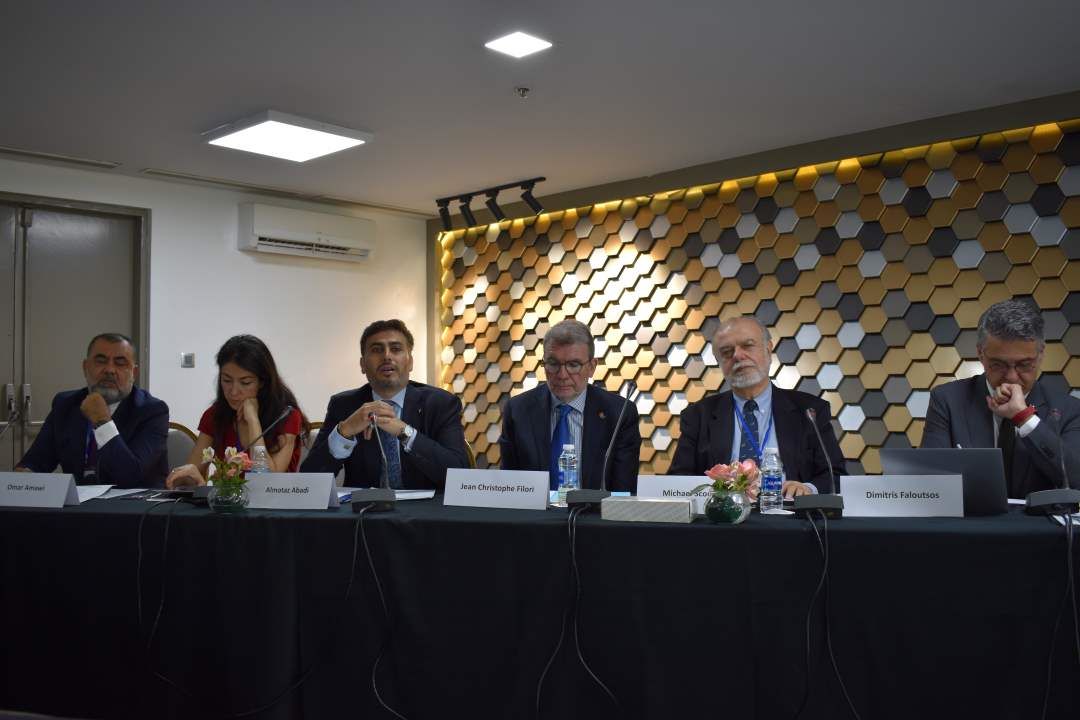
(Speakers from left to right) Mr. Omar Amawi, Deputy Director, PRIMA, Mr. Almotaz Abadi, UfM Deputy Secretary General in charge of Water, Environment and Blue Economy, Jean Christophe Filori, Head of Cooperation, EU Delegation to Morocco, Michael Scoullos, Team Leader, EU Water and Environment Support (WES) in the ENI Southern Neighbourhood region, Dimitris Faloutsos, Deputy Regional Coordinator, Global Water Partnership – Mediterranean (GWP-Med)
Mr. Jean-Christophe Filori, Head of Co-operation, EU Delegation to Morocco, noted that "The European Union has adopted an important position linking water, energy, food security and the ecosystems of water, soil and land. Through concrete initiatives such as this Nexus, the EU is supporting its partners to accelerate the necessary transitions, particularly in the Mediterranean region, which repeatedly suffers from extreme climatic phenomena, and where the management of resources, which are not unlimited, requires integrated policies, effective regional governance and sustainable investment".
According to Prof. Michael Scoullos, Team Leader, EU Water and Environment Support (WES) in the ENI Southern Neighborhood region the WEFE Nexus requires abolition of traditional sectoral silos approaches by connecting them through many and large communication channels. Furthermore, Nexus, provides ample space for maneuvering and mutually beneficial trade-offs. WEFE Nexus “is not a panacea, it is a tool”. He went on to complement that “It is not enough to bring the different elements together. The synergies between them make it a nexus. It is a cross sectoral arrangement”.
Mr. Vangelis Constantianos, Executive Secretary, GWP-Med, noted that “WEFE Nexus benefits will be best understood through in-the-field implementation that prove related policy-making options, decisions and investments. WEFE Nexus technical solutions are currently implemented through pilots in smart agriculture, green/blue cities, coastal management, and more, including nature-based solutions. Pilots should be upscaled and mainstreamed, while technical solutions should become available and affordable in the real market for the users to find, purchase and apply. Public awareness, entrepreneurship and investments are key for these to happen”.
Promoting a WEFE Nexus Community of Practice (CoP) among all types of stakeholders as well as demonstrators of policy and technical solutions, the PRIMA WEFE4MED Project made an open call to all concerned partners to join forces for achieving real change through collective learning and doing. Ms. Antonella Autino, Project Coordinator PRIMA Foundation said “The WEFE Nexus CoP is more than just an idea; it's a real-world laboratory where scalable solutions take shape. Through Nexus Demonstration Sites, we turn theories into practices and gain invaluable insights for tackling the challenges of water, energy, food, and ecosystems. As PRIMA, we are proud to lead this is building a resilient and sustainable Mediterranean.”
A short Report of the Roundtable is available on the right-hand side of the page.
